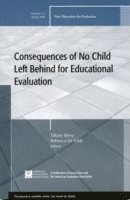
endast ny
Consequences of No Child Left Behind on Educational Evaluation: New Directi Upplaga 1
This volume explores how key aspects of No Child Left Behind (NCLB) have transformed the landscape of educational evaluation, and ultimately how this process is redefining what evaluation is within the educational evaluation community. In their chapters, the authors examine case studies, critical commentaries, and technical information related to the nexus between evaluation and NCLB. The volume is intended to stimulate conversation around fundamental issues in the discipline of evaluation, including blurring the lines among research, evaluation, and assessment; prioritizing summative evaluations over formative; using questions to drive research design rather than the reverse; balancing accountability requirements with other stakeholder needs; exploring the role of evaluation capacity building in an institutional setting; understanding the availability and appropriate use of assessment data; and defining learning outcomes that are based on standardized test scores alone. Evaluative activities have become integrated into the fabric of NCLB primarily through two core aspects of the legislation: responding to accountability systems and implementing scientifically based research. One plausible consequence of this close integration is that the purpose, design, and practice of evaluation may actually be transformed by this legislation. This volume describes these transformative influences and then explores the potential consequences. This is the 117th volume of the Jossey-Bass quarterly report series New Directions for Evaluation , an official publication of the American Evaluation Association.
Upplaga: 1a upplagan
Utgiven: 2008
ISBN: 9780470282380
Förlag: John Wiley & Sons
Format: Häftad
Språk: Engelska
Sidor: 120 st
This volume explores how key aspects of No Child Left Behind (NCLB) have transformed the landscape of educational evaluation, and ultimately how this process is redefining what evaluation is within the educational evaluation community. In their chapters, the authors examine case studies, critical commentaries, and technical information related to the nexus between evaluation and NCLB. The volume is intended to stimulate conversation around fundamental issues in the discipline of evaluation, including blurring the lines among research, evaluation, and assessment; prioritizing summative evaluations over formative; using questions to drive research design rather than the reverse; balancing accountability requirements with other stakeholder needs; exploring the role of evaluation capacity building in an institutional setting; understanding the availability and appropriate use of assessment data; and defining learning outcomes that are based on standardized test scores alone. Evaluative activities have become integrated into the fabric of NCLB primarily through two core aspects of the legislation: responding to accountability systems and implementing scientifically based research. One plausible consequence of this close integration is that the purpose, design, and practice of evaluation may actually be transformed by this legislation. This volume describes these transformative influences and then explores the potential consequences. This is the 117th volume of the Jossey-Bass quarterly report series New Directions for Evaluation , an official publication of the American Evaluation Association.
Ny bok
180 kr189 kr
5% studentrabatt med Studentapan
Begagnad bok (0 st)
Varje vecka tillkommer tusentals nya säljare. Bevaka boken så får du meddelande när den finns tillgänglig igen.



